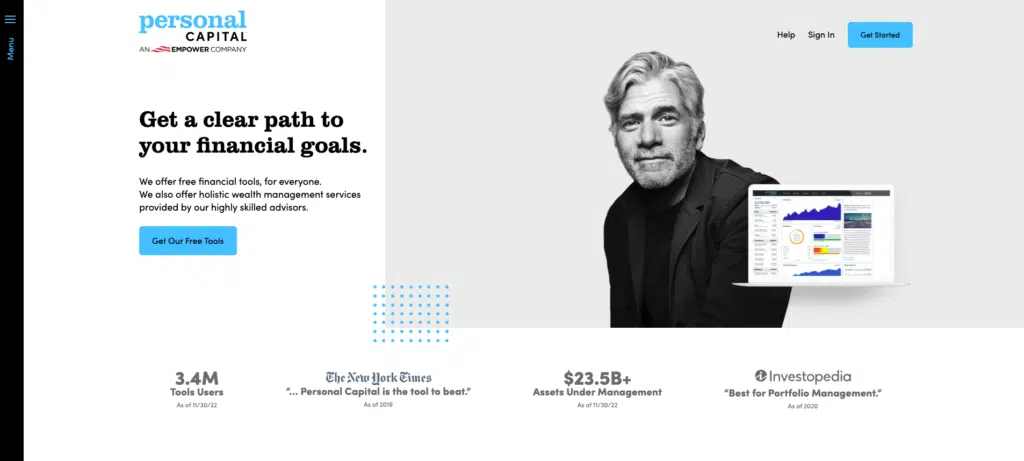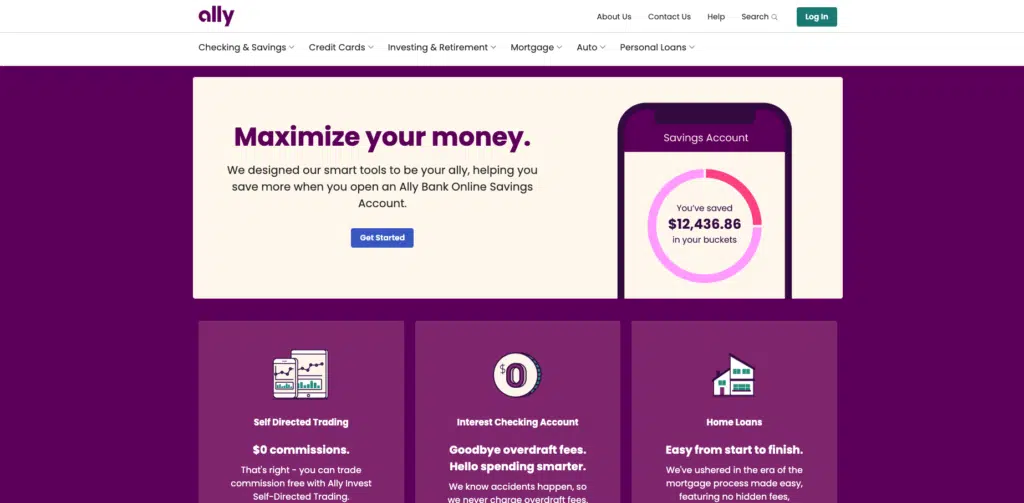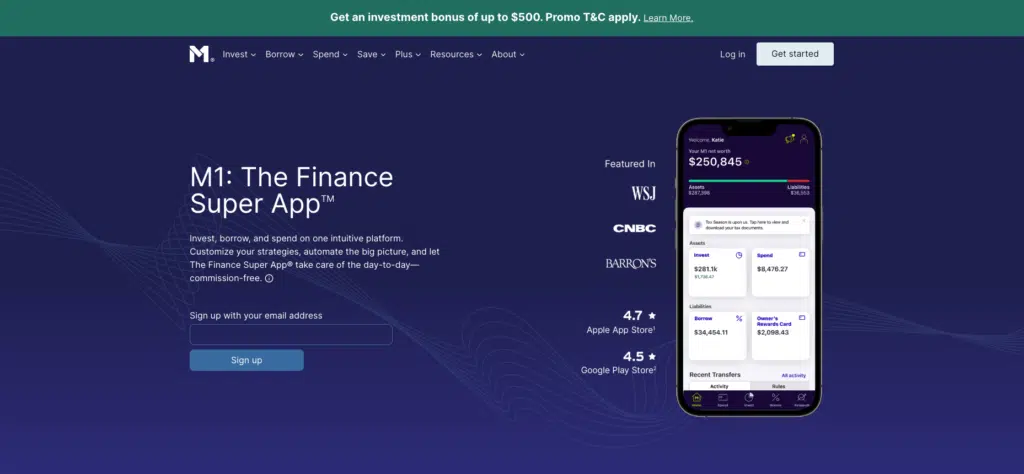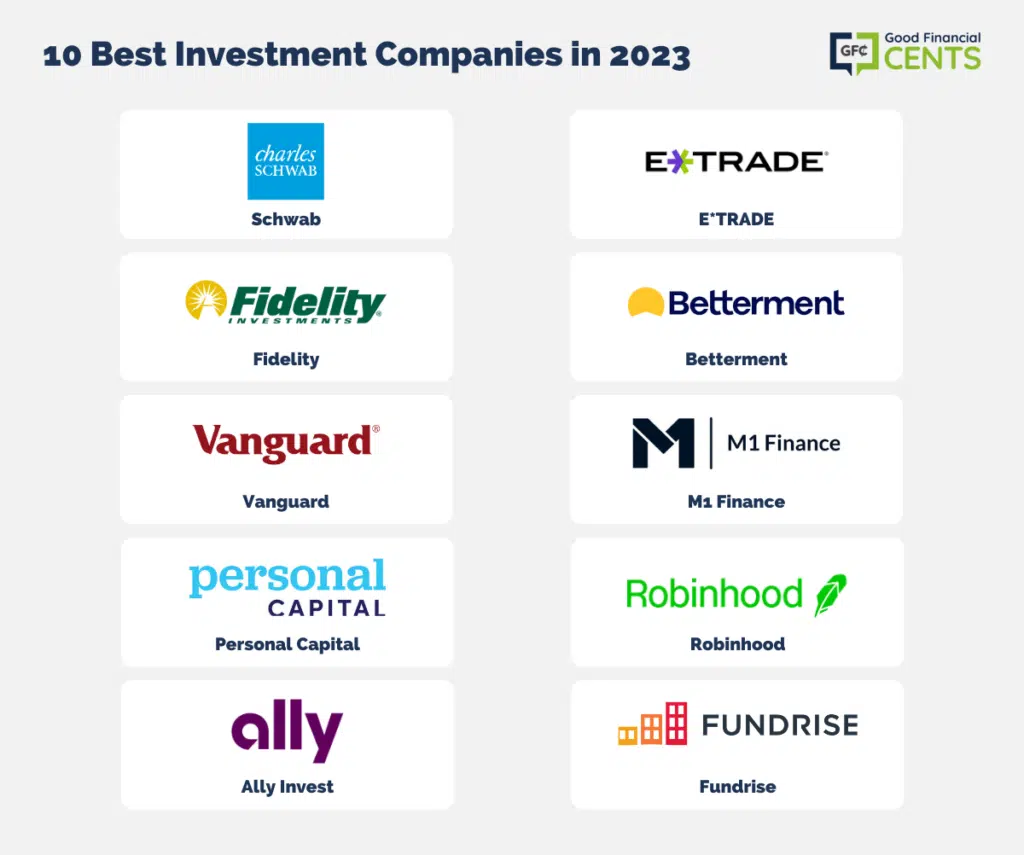Table of Contents
Types of Investment Companies
The following types of investment companies are represented in our guide:
- Investment brokerage firms – offer a wide variety of investments and are generally oriented toward self-directed investing.
- Investment management companies – firms that provide individual portfolio management and may work with other investment companies.
- Fund companies – organizations that sponsor various investment funds, typically exchange-traded funds (ETFs) and/or mutual funds.
- Robo-advisors – low-cost, automated investment services designed primarily for smaller investors.
- Real estate online platforms – offer the opportunity to invest in commercial real estate, specifically individual property deals – usually with a small upfront investment.
Of course, there are many other investment companies, including private equity firms, peer-to-peer lending platforms, and venture capital firms. But these are highly specialized businesses requiring separate discussions and aren’t ideal for the average investor.
How to Choose an Investment Company
The right investment company depends mainly on your investment style. For example, do you want to make investment decisions or let the experts do it through a managed portfolio?
“If you’re a passive investor who likes ETFs and hates fees, go with investment companies that offer a wide selection of low-cost index funds, such as Vanguard or Fidelity. On the other hand, robo-advisors like Betterment or M1 Finance to build your portfolio can also help you save money, particularly when you have modest savings and don’t qualify for the preferential fees available to wealthier investors.”
Robo-advisors, in particular, have democratized investment management. Where you once had to have a very large portfolio – $500,000 or more – to benefit from professional portfolio management, now it’s possible to get that advantage with just a few dollars.
“They have come a long way since inception and now allow you to invest in alternative assets like artwork and cryptocurrencies. A personal favorite of mine is M1 Finance because it allows you to create your own “pies” (portfolios) to help you diversify your investments.”
Finally, you don’t need to limit yourself to a single investment company. For example, you may hold some of your investments with a robo-advisor while maintaining an account with an investment brokerage firm for self-directed investing.
10 Best Investment Companies
Below are what we believe to be the ten best investment companies for most investors. They’re not ranked in any order. Instead, we’ve chosen to list what each is “best for” so that you can choose the one that will work best for you.
1. Schwab

Minimum initial investment: $0
Commissions & fees: $0 for stocks, options, and ETFs; over 4,000 commission-free mutual funds.
Available accounts: Joint and individual accounts; traditional, Roth, rollover, SEP, and SIMPLE IRAs; Solo 401(k)’s; trusts and custodial accounts.
Investments offered: Stocks, bonds, ETFs, mutual funds, options, futures, and CDs.
Best for: Any and all investors
Schwab is the largest retail investment broker in the world, and there are plenty of reasons why. Not only does the company offer virtually every type of investment (except cryptocurrencies), but it also has the best customer service in the industry. That includes 24/7 live support, as well as more than 360 local branches nationwide.
Schwab can also accommodate nearly any type of account, including an extensive list of retirement accounts. And because it offers many tools and resources, it works for novices and advanced day traders.
Key Features:
- Outstanding investment platform for investors at all levels.
- Wide selection of investments available.
- Full suite of investment tools and resources for self-directed investors.
- Managed investment options through Charles Schwab Intelligent Portfolios.
- 24/7 customer service that’s among the best in the industry.
- Over 360 brick-and-mortar branches if you prefer face-to-face customer service.
2. Fidelity

Minimum initial investment: $0
Commissions & fees: $0 for stocks, options, and ETFs; more than 3,000 commission-free mutual funds
Available accounts: Joint and individual accounts; traditional, Roth, rollover, SEP, and SIMPLE IRAs; Solo 401(k)s; trusts and custodial accounts
Investments offered: Stocks, bonds, mutual funds, ETFs, options, and other securities.
Best for: Any and all investors
Fidelity is perhaps Schwab’s biggest competitor and the two investing giants are similar in many respects. They mirror one another’s product offerings and programs. The preference for one over the other may come down to personal investment style more than anything else. Fidelity is an excellent choice for any investor.
Key Features:
- Superior investment platform for investors at all levels.
- Outstanding customer service, including a large number of local branch offices.
- Offers nearly unlimited investment options.
- One of the top investment platforms in the industry.
- Offers the Fidelity Go robo-advisor as a low-cost, managed portfolio option.
3. Vanguard

Minimum initial investment: $0 but $1,000 or more on many mutual funds
Commissions & fees: $20 account fee with account balance < $10,000 (waived with e-delivery of statements); commission-free trades for stocks, ETFs, and options (plus $1 per contract fee); 3,000+ no-fee mutual funds
Available accounts: Joint and individual accounts; traditional, Roth, rollover, SEP, and SIMPLE IRAs; Solo 401(k)s; trusts, 529, and custodial accounts
Investments offered: Stocks, ETFs, options, bonds, and mutual funds; Personal Advisory and Digital Advisor plans
Best for: Fund investors
Vanguard offers a brokerage platform, but the company is best known for its investment funds, including ETFs. Vanguard funds are among the most popular in the world. They are highly favored by investment managers, as well as robo-advisors.
“Vanguard offers various funds to invest in, and it also has low fees, lower than the industry average. While Vanguard funds are great for beginners, they are also good for intermediate and experienced investors.”
Key Features:
- Provider of some of the lowest-cost funds in the industry.
- Offers two managed portfolio options – Personal Advisory and Digital Advisor.
4. Personal Capital

Minimum initial investment: $0 for the free version, $100,000 for Wealth Management
Commissions & fees: Tiered annual management fee, starting at 0.89% and sliding down to 0.49% on larger accounts
Available accounts: Individual and joint brokerage accounts; traditional, Roth, rollover and SEP IRAs, and trusts; also provides advice on 401(k) plans
Investments offered: Typically, ETFs and individual stocks
Best for: Professional management of large portfolios
Personal Capital offers a free financial platform where you can aggregate all your financial accounts, including investment, bank, and loan accounts, and take advantage of many tools to help you manage your finances. But they also offer their Wealth Management service for investors with at least $100,000 to invest.
The investment service includes access to dedicated financial advisors and assistance with managing your employer-sponsored retirement plan. Personal Capital offers a lower fee structure than what you will pay for a traditional investment advisory firm while offering largely the same services. Check out my Personal Capital review for more information.
Key Features:
- Access to dedicated financial advisors.
- Advanced tax optimization strategies.
- Investment advice for employer-sponsored retirement plans.
- Lower fees than traditional investment advisors.
5. Ally Invest

Minimum initial investment: $0
Commissions & fees: Commission-free trades of stocks, ETFs, and options (plus a $0.50 per contract fee); $9.95 for no-load mutual funds, $0 for load funds
Available accounts: Individual, Joint, Custodial, Traditional IRA, Roth IRA, Rollover IRA, Coverdell
Investments offered: Stocks, OTC/Penny Stocks, ETFs, Mutual Funds, Bonds, Certificates of Deposit, and FOREX.
Best for: Investing with diversified financial services
Part of the Ally family, Ally Invest provides investors with a large portfolio of financial services. First, they offer self-directed investing, including margin trading. But if you prefer a managed option, they also offer Robo Portfolios, which you can open with a minimum investment of $100.
But the company also provides banking services, including a checking account and high-interest savings, as well as credit cards, personal loans, and mortgages. But their specialty is auto loans (Ally is the successor company of the former General Motors Acceptance Corporation (GMAC).) Read my Ally Invest review for more information.
Key Features:
- Offers both self-directed investing and managed portfolios.
- Highly regarded trading platform.
- Provides other financial services, including banking and most loan types.
6. E*TRADE

Minimum initial investment: $0
Commissions & fees: $0 stocks, ETFs, and options (+ $0.65 per contract fee); more than 7,000 no-transaction-fee mutual funds
Available accounts: Individual and joint investment accounts; traditional, Roth, and rollover IRAs
Investments offered: Stocks, bonds, ETFs, mutual funds, options, currencies, and futures
Best for: Self-directed investing
E*TRADE has come up fast in recent years as a top trading platform. Not nearly as large as Schwab or Fidelity, it’s nonetheless very popular among investors. It’s a solid platform for active traders, but also offers managed portfolio options. One of the best features is that they offer thousands of commission-free mutual funds. Learn more in our E*Trade review.
Key Features:
- Highly rated trading platform in Power E*TRADE.
- Commission-free trades of mutual funds.
- E*TRADE is now part of the Morgan Stanley family.
- Offers both self-directed investing and a managed option through their Core Portfolios.
7. Betterment

Minimum initial investment: $0 for the Digital plan; $100,000 for the Premium plan; $10 for the Cash Reserve account
Commissions & fees: 0.25% annual advisory fee for Digital plan; 0.40% annual advisory fee for Premium plan
Available accounts: Individual and joint taxable accounts; traditional, Roth, and SEP IRAs; checking and high-yield cash accounts; crypto portfolios, trusts
Investments offered: ETFs invested in U.S. and international stocks and bonds
Best for: Hands-off investment management at a very low cost.
Betterment is one of the first robo-advisors and remains on the leading edge of the field. As is typical with robo-advisors, you’ll begin by completing a brief questionnaire designed to determine your risk tolerance and investment goals. A portfolio of ETFs will be designed, including a mix of stocks, bonds, and other asset classes. For a low annual fee, all you need to do is fund your account, and Betterment will provide comprehensive portfolio management.
The company has expanded its product menu and now offers a checking account and a high-yield cash reserve. And while you can’t construct your own portfolio, Betterment does give you the option to increase or decrease investment positions. Find out more about Betterment in my full review.
Key Features:
- Fully automated investment management at a low cost.
- Can accommodate investors of all portfolio sizes, including beginners.
- Offers multiple portfolio options.
- Betterment Cash Reserve provides a high-interest savings option with your investment account.
- Betterment Premium provides access to live financial planners.
8. M1 Finance

Minimum initial investment: $0 to open an account, $100 to begin investing
Commissions & fees: No trading commissions or account management fees
Available accounts: Individual and joint taxable investment accounts; traditional, Roth, rollover, and SEP IRAs
Investments offered: Individual stocks and ETFs
Best for: Automated investing that lets you choose your investments and build your own portfolios.
If you like the idea of a robo-advisor but would prefer to choose your own investments, M1 Finance is the perfect investment company. You can build your own portfolios – known as “pies” – filling each with as many as 100 ETFs and individual stocks. From there, M1 Finance will provide complete portfolio management, including periodic rebalancing, at no cost. Learn more in my M1 Finance review.
Key Features:
- Create your own portfolios, which M1 Finance will fully manage.
- No fees to add funds and stocks to your portfolios and no annual management fee.
- Create as many portfolios as you like, built around your chosen themes.
9. Robinhood

Minimum initial investment: $0
Commissions & fees: Commission-free trades of stocks, options, ETFs, and cryptocurrencies.
Available accounts: Individual taxable investment accounts and traditional and Roth IRAs.
Investments offered: Stocks, ETFs, options, and cryptocurrencies.
Best for: Fast trading and diversification into cryptocurrencies.
Robinhood is an investment app designed for fast, commission-free trading. And not only do they offer the usual lineup of stocks, ETFs, and options, but you can also invest in cryptocurrencies. You can invest in any of these asset classes commission-free. For more details, check out my Robinhood review.
Key Features:
- Fast, efficient investment app.
- Offers cryptocurrency investing on the same platform where you hold other investments.
- Commission-free trades on stocks, ETFs, options, and cryptocurrencies.
10. Fundrise

Minimum initial investment: $10
Commissions & fees: Fundrise charges a 0.15% advisory fee
Available accounts: Individual and joint taxable accounts, Self-Directed IRAs (SDIRAs) only
Investments offered: Private real estate investments. Their Flagship Real Estate Fund offers long-term appreciation from a diversified portfolio of their most favored real estate investment strategies.
Best for: Diversification into private real estate assets with a small investment.
Real estate investments offer excellent diversification within a portfolio dominated by financial assets. Fundrise is a real estate platform that allows small investors to participate in commercial real estate deals.
You can invest in residential deals through their Flagship Real Estate Fund. You can begin investing with as little as $10. Learn more in my full Fundrise review.
Key Features:
- Invest in either residential or commercial property deals.
- Minimum investment of $10
- Offers multiple portfolio options, depending on your portfolio size and risk tolerance.
- Unlike most real estate online platforms, Fundrise lets investors liquidate their holdings.
| I’ve been investing with Fundrise since 2018. Disclosure: when you sign up with my link, I earn a commission. All opinions are my own. |

Final Thoughts
Selecting the right investment company is a crucial decision that can significantly influence one’s financial future. It’s not just about entrusting your hard-earned money but also about forging a partnership that aligns with your financial goals, risk tolerance, and investment horizon. As highlighted in the article, it’s imperative to consider factors like the company’s reputation, its fee structure, the range of investment options provided, and the quality of customer service. By diligently researching and assessing potential firms against your own criteria, you can confidently choose an investment company that will serve your best interests and help navigate the complex world of investing. Remember, the right investment partner can be the catalyst that propels you towards achieving your financial aspirations.
Investment Company FAQs
Naming a single best investment firm depends on who you ask. However, Schwab is the largest investment broker in the world. As of 2021, the company reported total assets under management of more than $8 trillion.
There’s no one-size-fits-all when it comes to investing. Your ideal holdings should be determined by your time horizon and risk tolerance, among other factors.
Once you know your risk tolerance level, creating the proper mix of equities and fixed-income investments will be easier. And once you know that, it’s generally best to begin investing with funds like ETFs or low-cost mutual funds. Each will provide you with a portfolio of securities within a specific asset class. Tools like this Vanguard Investor Questionnaire can help you identify the right types of investments for your portfolio.
If safety is your top priority, I recommend investing in high-yield savings accounts, certificates of deposit (CDs), or U.S. Treasury securities. None of these will make you rich, but they will keep your principal safe and provide a decent return. Consider dividend-paying or preferred stocks if you’re willing to take on more risk in search of higher returns.
Millionaires hold many of the same investments in their portfolios as average investors. However, commercial real estate, private equity funds, and venture capital are examples of more exclusive investments that are usually only available to wealthy, accredited investors.
Final Thoughts
As you can see, there are more than enough investment companies to suit every type of investor, and each one has several strengths. If you’re still struggling to decide which platform is right for you, decide on an investment style, and that will help you narrow your choices.
Do you want full control over the day-to-day decision-making, or would you rather take a “set it and forget it” approach? These are the kinds of questions to ask yourself. You may also want to ask other investors you know about their experiences with the various platforms.








